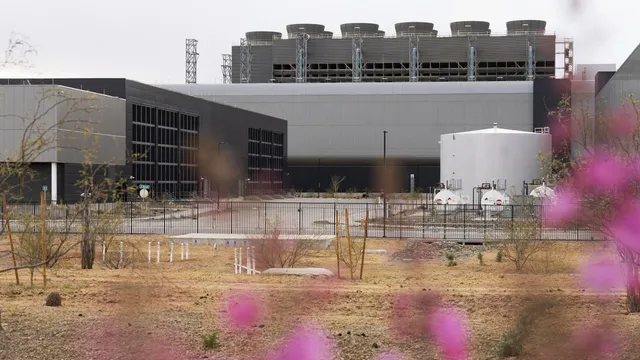
Taiwan's leaders praise $100 billion TSMC investment in Arizona as a supply chain model
2025-03-20 09:43- TSMC's $100 billion commitment to Arizona includes three chip foundries, an R&D center, and packaging facilities.
- The investment aiming to reduce reliance on Chinese suppliers is part of Taiwan's strategy to build a resilient supply chain.
- Governor Hobbs expressed optimism about the project's job creation and its role in strengthening bilateral ties.
Express your sentiment!
Insights
In a meeting held recently, Taiwan's President William Lai Ching-te met with Arizona's Governor Katie Hobbs to discuss the significant investment by Taiwan Semiconductor Manufacturing Company (TSMC) in Arizona. TSMC is committing $100 billion to establish three chip foundries, an R&D center, and two packaging facilities in the state. This investment is seen as a strategic move to reduce dependence on Chinese semiconductor suppliers, especially in light of growing geopolitical tensions. TSMC has a history of significant investments in the U.S., with a prior commitment of $65 billion for additional foundries in the region. During the discussions, Lai emphasized that both Taiwan and Arizona are collaboratively working towards creating a “non-red” supply chain, which deliberately excludes suppliers based in China. This collaboration is pertinent as China has made military threats asserting its claim over Taiwan. In this context, the partnership seeks not only to bolster supply chain resilience but also to align technology production with broader geopolitical goals. TSMC, which accounts for over 90% of advanced semiconductor manufacturing, indicated that its U.S. developments would not compromise its operations in Taiwan, where it employs around 10,000 people focused on cutting-edge chip research. Governor Hobbs shared her enthusiasm regarding Arizona's evolving role as a significant hub for advanced manufacturing, predicting the creation of 40,000 construction jobs over the next four years. Additionally, the project is expected to provide tens of thousands of jobs in technology and manufacturing sectors. Hobbs highlighted that TSMC's investment would not only advance global technology, including artificial intelligence, but also serve to strengthen U.S.-Taiwan relations amidst rising tensions with China. The essence of this collaboration highlights the intersections in economic and foreign policy, illustrating how chip manufacturing has become a central issue within broader discussions of national security and economic independence from China. As Taiwan pushes to foster a self-reliant semiconductor supply chain, the sizeable investment by TSMC stands as a pivotal moment in U.S.-Taiwan economic relations, reflecting a shared commitment to security and technological advancement in the face of challenges posed by Chinese aggression.
Contexts
The collaboration between Taiwan and the United States in the semiconductor supply chain has become increasingly vital in the context of global technology dynamics. Taiwan, with its world-leading semiconductor manufacturing capabilities, exemplified by companies such as Taiwan Semiconductor Manufacturing Company (TSMC), plays a critical role in the global supply chain for semiconductors. The U.S. seeks to reinforce its technological edge and ensure a steady supply of semiconductors, which are indispensable for various sectors, including consumer electronics, automotive, and advanced technologies such as artificial intelligence and 5G. The growing reliance on semiconductor technology has made the stability of this supply chain a matter of national interest for both nations, prompting deeper cooperation to mitigate risks associated with geopolitical tensions and supply chain disruptions. The strategic partnership between Taiwan and the U.S. centers around ensuring reliable access to semiconductor technology and maintaining an open market. A key aspect of their collaboration is investment in semiconductor research and development, aimed at fostering innovation and addressing technological challenges. Both governments have signaled their commitment to work closely with industry leaders in Taiwan and the U.S. This partnership is also manifesting in the establishment of research centers and joint ventures focused on next-generation chip technologies. By pooling resources and expertise, both countries can advance their respective semiconductor industries and secure their positions in the global market. Moreover, the collaboration extends beyond mere manufacturing. It encompasses efforts to strengthen the entire semiconductor ecosystem, including design, supply chain logistics, and workforce development. The U.S. is investing in domestic semiconductor capabilities and workforce training programs to reduce dependency on foreign supply chains. Conversely, Taiwan is addressing its own challenges by expanding its technological prowess and engaging in cooperative projects with U.S. firms. This comprehensive approach not only ensures the sustainability of the semiconductor supply chain but also encourages resilience against potential disruptions, whether from natural disasters or geopolitical conflict. As the world increasingly becomes digitalized, the significance of semiconductors cannot be overstated. The U.S.-Taiwan collaboration is not merely about economic interests but extends into areas of national security and technological leadership. The partnership symbolizes a proactive strategy to counteract the competitive pressures from nations like China, which has made significant strides in semiconductor manufacturing. Looking forward, it is imperative for both Taiwan and the U.S. to maintain this collaborative spirit and continue adapting to the fast-evolving technological landscape to ensure the robustness of their semiconductor supply chain.